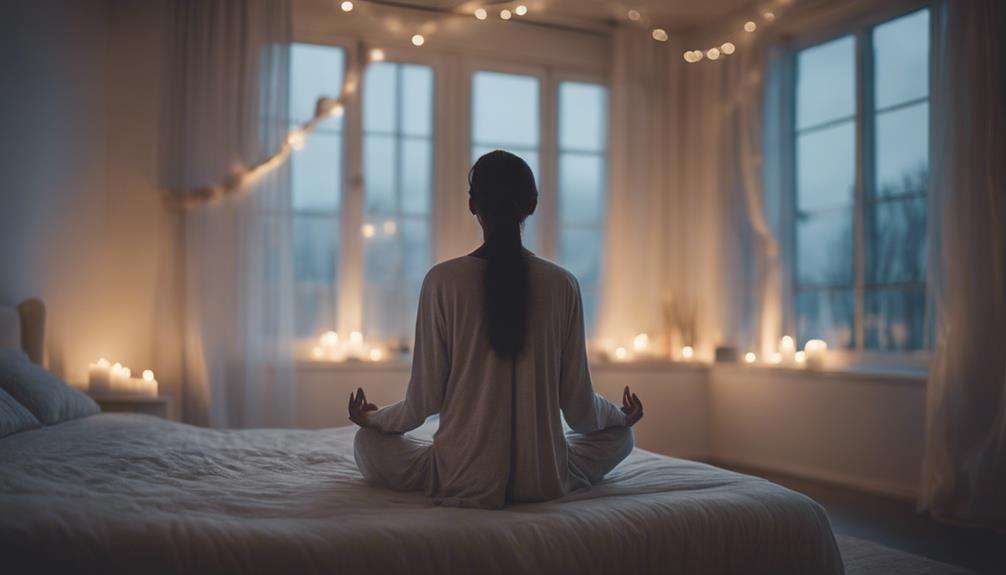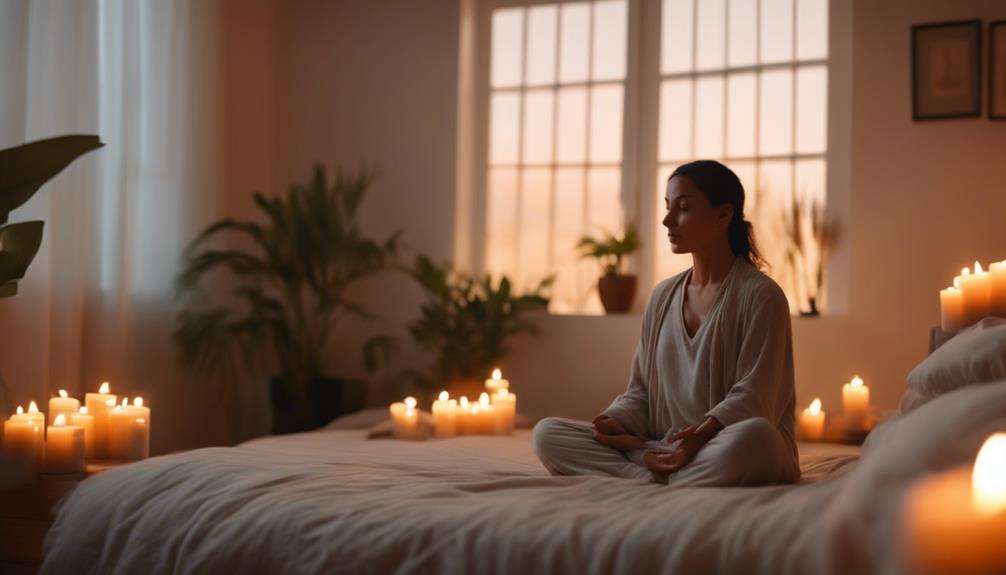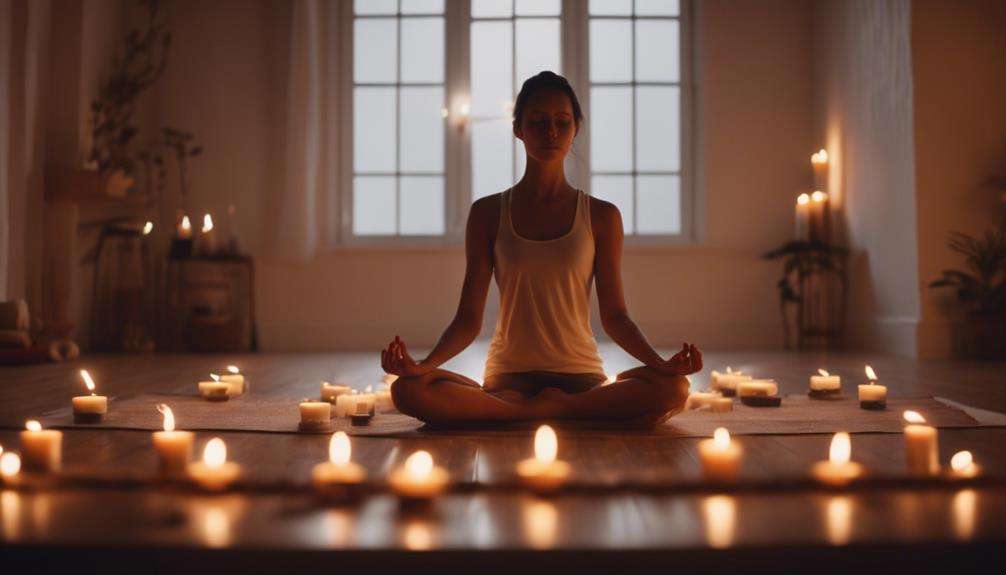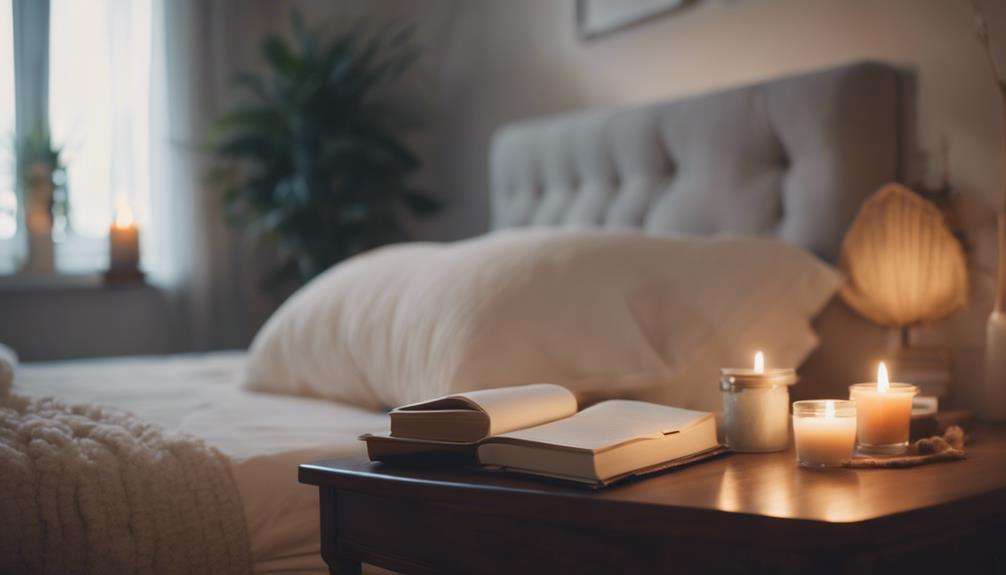So, you think counting sheep is the ultimate sleep hack? Think again. Dive into the realm of mindfulness practices tailored to enhance your sleep quality.
From mindful breathing to yoga poses for sleep, these techniques offer a gateway to a tranquil slumber.
Curious to unlock the secrets of a serene bedtime routine?
Key Takeaways
- Engage in mindful breathing exercises to activate relaxation response and regulate the nervous system for improved sleep quality.
- Practice gentle yoga or stretching before bed to relax muscles, ease physical discomfort, and aid restful sleep.
- Utilize guided meditations and visualization techniques to calm the mind, induce calmness, and promote mindfulness before bedtime.
- Create a tranquil sleep environment by incorporating mindfulness into bedtime rituals, fostering feelings of contentment, and reducing stress.
Mindful Breathing Techniques
Unlock the power of mindful breathing techniques to enhance your sleep quality and overall well-being. By incorporating mindful breathing into your bedtime routine, you can tap into the relaxation response of your body, promoting a sense of calmness and tranquility. The slow, deep breaths associated with mindfulness not only help in balancing hormones but also play a crucial role in regulating your circadian rhythm, signaling to your body that it's time to wind down and prepare for sleep. This practice aids in promoting healthy sleep patterns by quieting the mind and reducing stress and anxiety levels.
When you focus on breath awareness during mindfulness practice, you create a space for inner peace and stillness, allowing your mind to settle and quieten. By incorporating mindful breathing techniques into your nightly ritual, you can effectively calm the mind, setting the stage for a restful night's sleep. Start by taking a few moments to engage in mindful breathing before bed, and notice the positive impact it has on your sleep quality and overall well-being.
Yoga Poses for Sleep
Enhance your sleep quality and promote relaxation by incorporating specific yoga poses into your bedtime routine. Yoga poses like Child's Pose, Legs Up the Wall, and Corpse Pose are known to reduce stress, calm the mind, and improve sleep quality.
These gentle yoga sequences prepare your body for a peaceful night's rest by releasing tension and promoting a sense of calm. Poses such as Forward Fold and Cat-Cow Stretch can help you unwind before bedtime, allowing you to let go of the day's stressors.
Studies have shown that regular practice of yoga for sleep can lead to better sleep duration, reduced insomnia symptoms, and enhanced overall sleep satisfaction.
Consider integrating soothing poses like Pigeon Pose and Reclining Bound Angle Pose into your nightly routine to relax both your body and mind, setting the stage for a restful and rejuvenating sleep experience.
Guided Meditation Practices
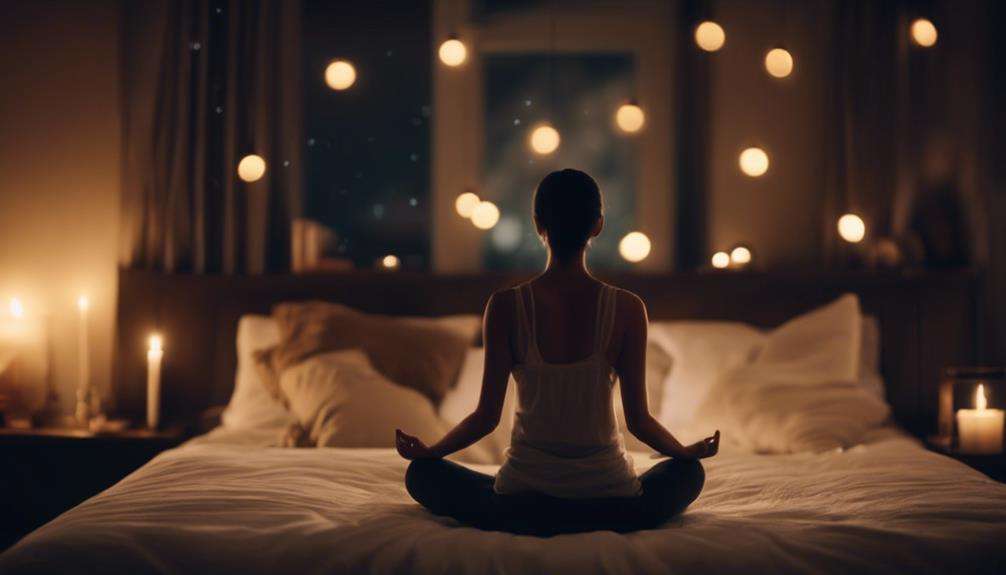
Begin your journey towards better sleep with guided meditation practices designed to induce relaxation and calmness before bedtime. Guided meditation involves following a meditation instructor's voice to help you unwind and focus your mind, making it an excellent tool for reducing stress and improving sleep quality.
Here's why you should consider incorporating guided meditation into your bedtime routine:
- Reduces Stress: By following guided meditation, you can release the tension accumulated during the day, allowing your mind to unwind and prepare for a restful night's sleep.
- Enhances Sleep Quality: Guided meditation aids in calming the mind and promoting relaxation, which can lead to improved sleep quality and a more rejuvenating rest.
- Promotes Relaxation: Through deep breathing exercises and visualization techniques, guided meditation guides your mind into a state of tranquility, making it easier to drift off to sleep.
- Facilitates Visualization: Visualization techniques used in guided meditation can help create a peaceful mental space, ideal for easing into a restful slumber.
Incorporating guided meditation practices into your nightly routine can significantly contribute to a more peaceful and restorative sleep experience.
Body Scan for Relaxation
When you practice body scan for relaxation, you'll focus on each body part, increasing your awareness and promoting deep relaxation.
This technique helps release tension and stress by tuning into physical sensations throughout your body.
Mindful Awareness of Body
For better sleep quality and relaxation, consider incorporating the practice of body scan meditation into your bedtime routine. Body scan meditation involves systematically focusing on different parts of the body to increase awareness and promote relaxation.
Here's why this technique is beneficial:
- Enhances mindfulness and awareness of physical sensations.
- Helps release tension and stress by relaxing each body part.
- Improves sleep quality by calming the mind and body.
- Prepares you for a restful night's sleep by cultivating body awareness.
Progressive Muscle Relaxation
Consider incorporating progressive muscle relaxation, also known as body scan meditation, into your nightly routine to promote deep relaxation and prepare your body for a restful sleep. This mindfulness practice involves systematically tensing and relaxing muscle groups, releasing physical tension, and reducing stress.
By focusing on each body part sequentially, body scan meditation enhances body awareness, promotes relaxation, and increases mindfulness of physical sensations. It helps individuals let go of accumulated tension and stress, ultimately improving sleep quality and overall well-being. Research supports its effectiveness in reducing anxiety.
Begin by finding a comfortable position, starting from your toes, tensing the muscles for a few seconds, then releasing. Progressively move up through each body part, experiencing deep relaxation and stress reduction along the way.
Calm Breathing Techniques
To enhance your relaxation further, let's now explore the calming breathing techniques integrated within the body scan practice. Body scan meditation is a powerful mindfulness practice that aids in tension release and promotes relaxation, ideal for improving sleep quality and bedtime relaxation.
By systematically scanning your body from head to toe, you can pinpoint areas of tension and consciously relax them. This technique fosters present moment awareness, redirecting your focus away from racing thoughts and towards a peaceful transition into sleep.
- Identify areas of tension
- Consciously relax the body
- Foster present moment awareness
- Promote peaceful transition into sleep
Gratitude and Sleep Connection
Improve your sleep quality and find peace by embracing gratitude before bedtime, a practice known to reduce stress and enhance relaxation. Cultivating a sense of thankfulness through gratitude exercises can shift your focus from negative thoughts to positive emotions, fostering feelings of contentment and tranquility as you prepare for sleep.
Research indicates that expressing gratitude is linked to better sleep outcomes and overall well-being. By incorporating gratitude into your bedtime routine, you can help lower cortisol levels, which in turn calms the mind and improves your ability to fall asleep. This positive mindset created through gratitude practices sets the stage for a restful night's sleep.
Mindful Movement Before Bed
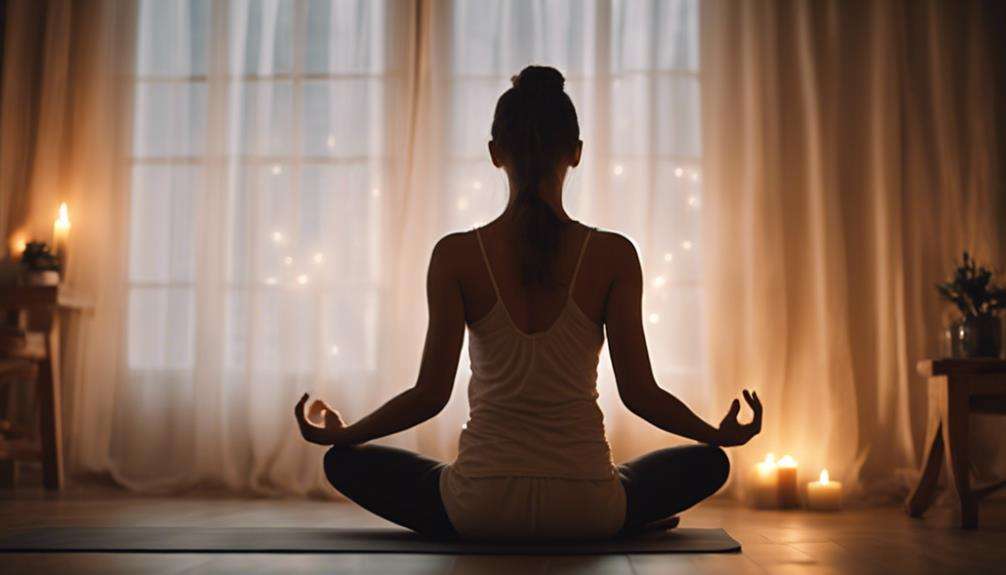
Engage in gentle yoga or stretching before bed to relax your body and calm your mind, promoting a sense of peace and readiness for a restful night's sleep. Mindful movement is a powerful tool in preparing your body and mind for bedtime. Here are some ways mindful movement can enhance your sleep routine:
- Gentle Yoga: Practicing gentle yoga poses can help release tension and ease any physical discomfort accumulated during the day.
- Stretching: Incorporating stretching exercises before bed can relax your muscles and improve circulation, aiding in a more restful sleep.
- Tai Chi: The slow, deliberate movements of tai chi can promote relaxation and mindfulness, setting the stage for a peaceful night's rest.
- Guided Meditations: Utilizing guided meditations focused on movement and relaxation can further enhance your bedtime routine, calming your mind and preparing your body for sleep.
Progressive Muscle Relaxation
Prepare yourself for a deeper and more restful sleep by exploring the practice of Progressive Muscle Relaxation (PMR). PMR involves consciously tensing specific muscle groups before releasing the tension, promoting relaxation throughout the body. By incorporating PMR into your bedtime routine, you can effectively reduce both physical and mental tension, making it easier to drift off to sleep. This technique is particularly beneficial for individuals experiencing stress and anxiety, as it helps alleviate these symptoms, allowing for a more peaceful night's rest.
Research has shown that PMR isn't only effective in improving sleep quality but also in reducing symptoms of insomnia. By systematically engaging each muscle group, individuals can enhance their body awareness and cultivate a sense of calmness, setting the stage for a tranquil night. By practicing PMR regularly, you can unwind, release accumulated tension, and prepare your body and mind for a rejuvenating sleep experience.
Visualization for Better Sleep

When struggling to unwind before bedtime, visualizing calming scenes like a serene beach or lush forest can be incredibly helpful.
By picturing these tranquil settings, you can ease stress and anxiety, setting the stage for a more restful night's sleep.
Guided imagery and dreamscapes can guide your mind towards relaxation, shifting your focus away from worries and towards peaceful thoughts.
Guided Imagery Benefits
To enhance your sleep quality and promote relaxation, consider utilizing guided imagery techniques that involve visualizing calming and peaceful scenes. Guided imagery is a powerful tool that can significantly benefit your overall well-being by reducing stress, anxiety, and symptoms of insomnia.
When you engage in guided imagery before bed, you create a mental escape from the daily stressors that may be keeping you awake. This practice can help quiet your mind and improve sleep onset, allowing you to drift off more easily.
Incorporating guided imagery into your bedtime routine can enhance your body's relaxation response, setting the stage for a restful night's sleep.
- Reduces stress, anxiety, and insomnia symptoms
- Creates a mental escape from daily stressors
- Quiets the mind for improved sleep onset
- Enhances the body's relaxation response
Dreamscape Visualization Tips
Consider immersing yourself in vivid dreamscape visualization as a powerful technique to enhance your sleep quality and promote relaxation.
By creating detailed mental images of peaceful scenes or imaginary scenarios, you can reduce anxiety and prepare your mind for a restful night.
Studies have shown that engaging in dreamscape visualization can promote deeper sleep, ultimately improving your overall well-being.
Visualizing serene landscapes or soothing settings before bedtime can help calm your thoughts and set the stage for a more peaceful sleep experience.
Incorporating this practice into your bedtime routine may lead to a significant enhancement in sleep quality, contributing to a more rejuvenating and refreshing rest each night.
Mindful Eating for Sleep Quality
For better sleep quality, incorporating mindful eating techniques into your daily routine can significantly enhance your overall well-being. Mindful eating involves being present while you eat, which can positively impact your sleep quality. Here are some ways how mindful eating can benefit your sleep:
- Promotes Healthy Eating Patterns: By being mindful of what you eat, you're more likely to make healthier food choices, which can contribute to improved sleep quality.
- Reduces Late-Night Snacking: Mindful eating helps you become more aware of your body's hunger cues, reducing the likelihood of unnecessary late-night snacking that can disrupt your sleep.
- Enhances Better Sleep Hygiene: Practicing mindful eating techniques like savoring each bite and eating slowly can promote better sleep hygiene, setting the stage for a restful night.
- Aids Digestion and Relaxation: Eating mindfully encourages slower eating, aiding digestion and potentially reducing discomfort that could interfere with your sleep. Moreover, a mindful approach to food consumption can help alleviate stress and promote relaxation before bedtime.
Mindfulness Rituals for Bedtime

Are you struggling to unwind before bed and find yourself tossing and turning all night? Incorporating mindfulness rituals into your bedtime routine can help calm your mind and signal your body that it's time to sleep.
Relaxing Bedtime Routines
To enhance your sleep quality and promote relaxation, incorporating mindfulness rituals into your bedtime routine can be incredibly beneficial. Here are some relaxing bedtime routines to consider:
- Deep Breathing: Engage in mindfulness meditation or deep breathing exercises to calm the mind and body.
- Body Scans: Practice body scans to release tension and prepare for a restful night's sleep.
- Tranquil Sleep Environment: Create a peaceful atmosphere by dimming lights, reducing noise, and disconnecting from screens.
- Gentle Stretching: Incorporate gentle stretching or yoga poses to relax muscles and unwind before bedtime.
Mindful Breathing Exercises
Consider integrating mindful breathing exercises into your bedtime routine to calm your mind and prepare for a restful night's sleep. Mindful breathing involves focusing on your breath, allowing deep, slow inhalations and exhalations. This practice activates the relaxation response in your body, reducing stress levels and promoting a sense of tranquility.
By incorporating mindful breathing rituals before bed, you can regulate your nervous system, which in turn leads to improved sleep quality. Quiet your mind by dedicating a few minutes to mindful breathing, helping you ease into a state of relaxation conducive to restful sleep.
Establishing a consistent bedtime routine that includes mindful breathing can be a powerful tool for achieving a peaceful and rejuvenating night's rest.
Calming Visualization Techniques
Integrating calming visualization techniques into your bedtime routine can help quiet your mind and promote a sense of relaxation conducive to a restful night's sleep. By incorporating positive imagery and peaceful scenes, you can create a soothing mental environment that reduces stress and anxiety, setting the stage for better sleep.
Here are some key points to consider:
- Visualizing serene places or scenarios can shift your focus from worries to positive imagery.
- Studies indicate that visualization aids in reducing stress and anxiety, enhancing relaxation for improved sleep quality.
- Calming visualization as part of bedtime rituals signals your brain that it's time to unwind and prepare for rest.
- Visualization techniques are powerful tools to quiet the mind, reduce racing thoughts, and facilitate a peaceful transition into sleep.
Frequently Asked Questions
How Can Mindfulness Improve Sleep?
Mindfulness can enhance sleep by calming your mind and body. It reduces stress and anxiety, preparing you for restful sleep. Breathing exercises, body scans, and relaxation techniques help you focus on the present, promoting better sleep quality.
How Do You Fall Asleep With Mindfulness?
Struggling to sleep? Start with mindful breathing for calm. Try a body scan to release tension. Engage in relaxation response techniques. Enhance sleep hygiene with mindful visualization. Practice progressive relaxation and mindful movement for a restful night.
How Can I Use Meditation to Sleep Better?
To use meditation for better sleep, try different techniques like mindfulness exercises and breathing exercises. Create a bedtime routine that includes relaxation methods to strengthen the mind-body connection. These practices can calm your mind and promote restful sleep.
Should You Do Mindfulness Before Bed?
Yes, you should do mindfulness before bed. Engaging in evening routines like mindful breathing, bedtime meditation, and relaxation techniques can calm your mind. Practice mindful body scans and nighttime mindfulness for a peaceful transition to sleep.
Conclusion
As you embrace these mindfulness techniques for better sleep, remember that each breath, each stretch, and each moment of relaxation is a step towards a peaceful night's rest.
Let your worries drift away like leaves in the wind, and allow yourself to sink into a deep slumber like a boat gently rocking on calm waters.
With mindfulness as your guide, may your nights be filled with tranquility and your mornings with rejuvenation.
Good night and sweet dreams.

